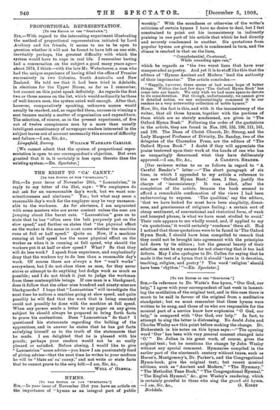HYMNS.
ITO TH It EDITOR OF TIIR " SF ROTATOR.") • Six,—In your issue of November 21st you have an article on the importance of "hymns as an integral part of public
worship." With the soundness or otherwise of the writer's criticismof certain hymns I have no desire to deal, but I feel constrained to point out his inconsistency in indirectly
praising in one part of his article that which he had directly and severely condemned in another. Six quotations from popular hymns are given, each is condemned in turn, and the climax is reached in that on the lines, "Consubstantial, Co-eternal, While .unending ages run," which he regards as "the two worst lines that have ever masqueraded as poetry. And yet it is to stuff like this that the editors of 'Hymns Ancient and Modern lend the authority of their imprimatur." The article concludes:— " Happily, however, there seems at last some hope of better things. Within the last few days 'The Oxford Hymn Book' has come into our hands. We only wish we had more space to devote to its consideration. ' But though, unfortunately, we cannot give it detailed notice, we can unhesitatingly commend it to our readers as a very noteworthy collection of noble hymns."
Now, Sir, the fact is this, and with it the inconsistency of the writer, that all those hymns, together with the portions of
them which are so sternly eondemned, are given in "The Oxford Hymn Book." Following the order of the quotations in the article, they are found in Nos. 198, 135, 180, 111, 161,
and 198. The Dean of Christ Church, Dr. Strong, and the Lady Margaret Professor of Divinity, Dr. Sanday, two of the delegates of the Clarendon Press, are the editors of "The
Oxford Hymn Book." I doubt if they will appreciate the praise bestowed upon their work at the hands of one who has so unsparingly denounced what they have deliberately [Our reviewer writes to us as follows in regard to "A Careful Reader's" letter :—" The short paragraph of six lines, in which I appended to my article a reference to the new Oxford Hymn Book,' does, I fear, justify the charge of 'inconsistency.' It was added, after the completion of the article, Ifecause the book seemed to afford a remarkable confirmation of the views I had been endeavouring to express. 'The qualities,' say the editors,
'that we have looked for most have been simplicity, direct- ness, and genuineness of religious feeling : a certain sort of cheap sentiment, of conventional and rhetorical form, of weak and honeyed phrase, is what we have most studied to avoid.'
Their. rule appears to me wholly sound, and, if applied to ray 'six quotations,' it would certainly 'condemn' them all. Had
I noticed that those quotations were to be found in The Oxford Hymn Book, I should have been compelled to remark that they could not be brought into agreement with the principles laid down by its editors ; but the general beauty of their
selection must be my excuse for not observing that it too had defects. May I also apologise to Dr. Cullen for saying that be made it the test of a hymn that it should 'have in it devotion, teaching, religion, and poetry ' ? The word 'religion' should have been 'rhythm.' "—ED. Spectator.]






































































 Previous page
Previous page